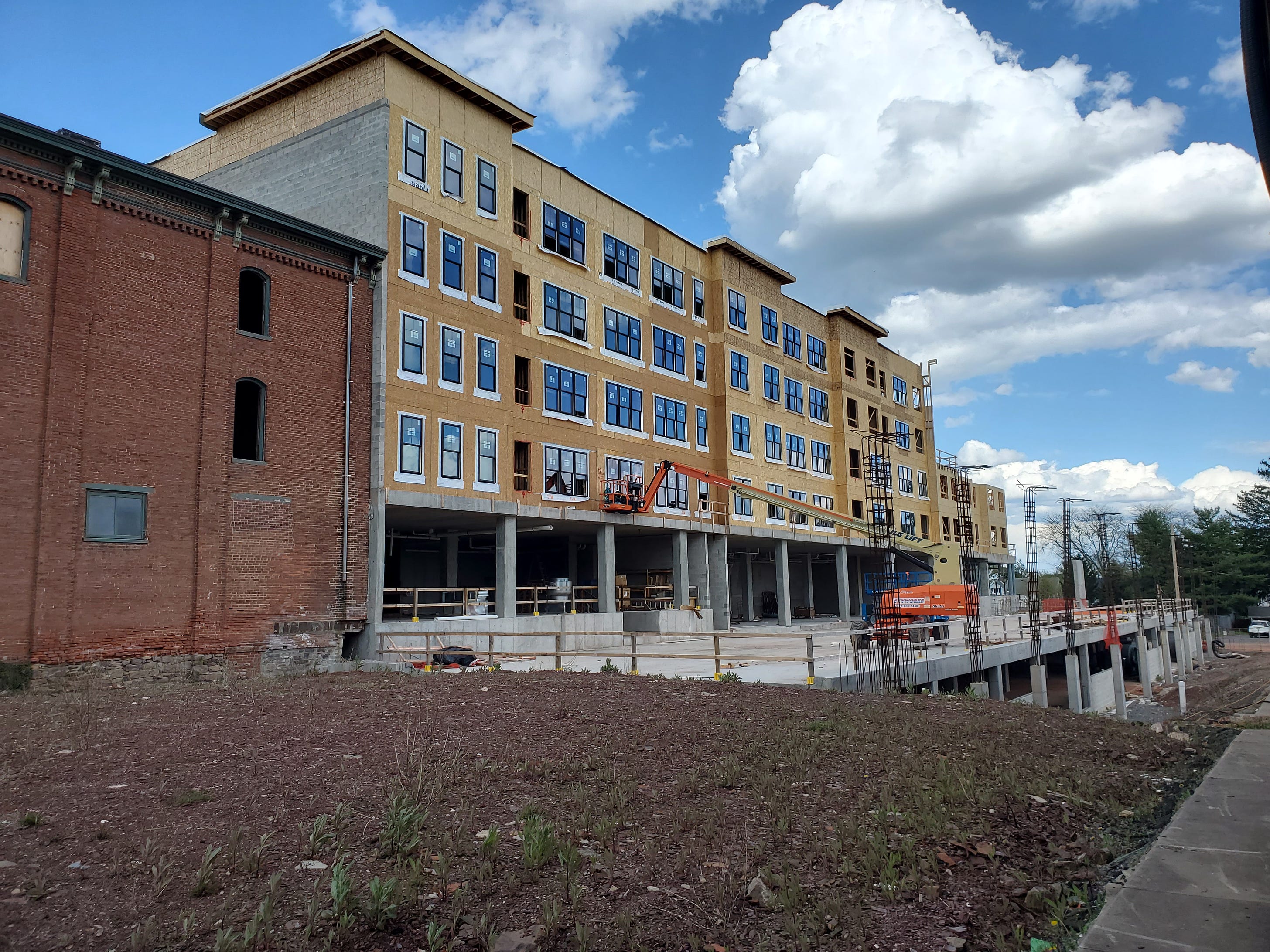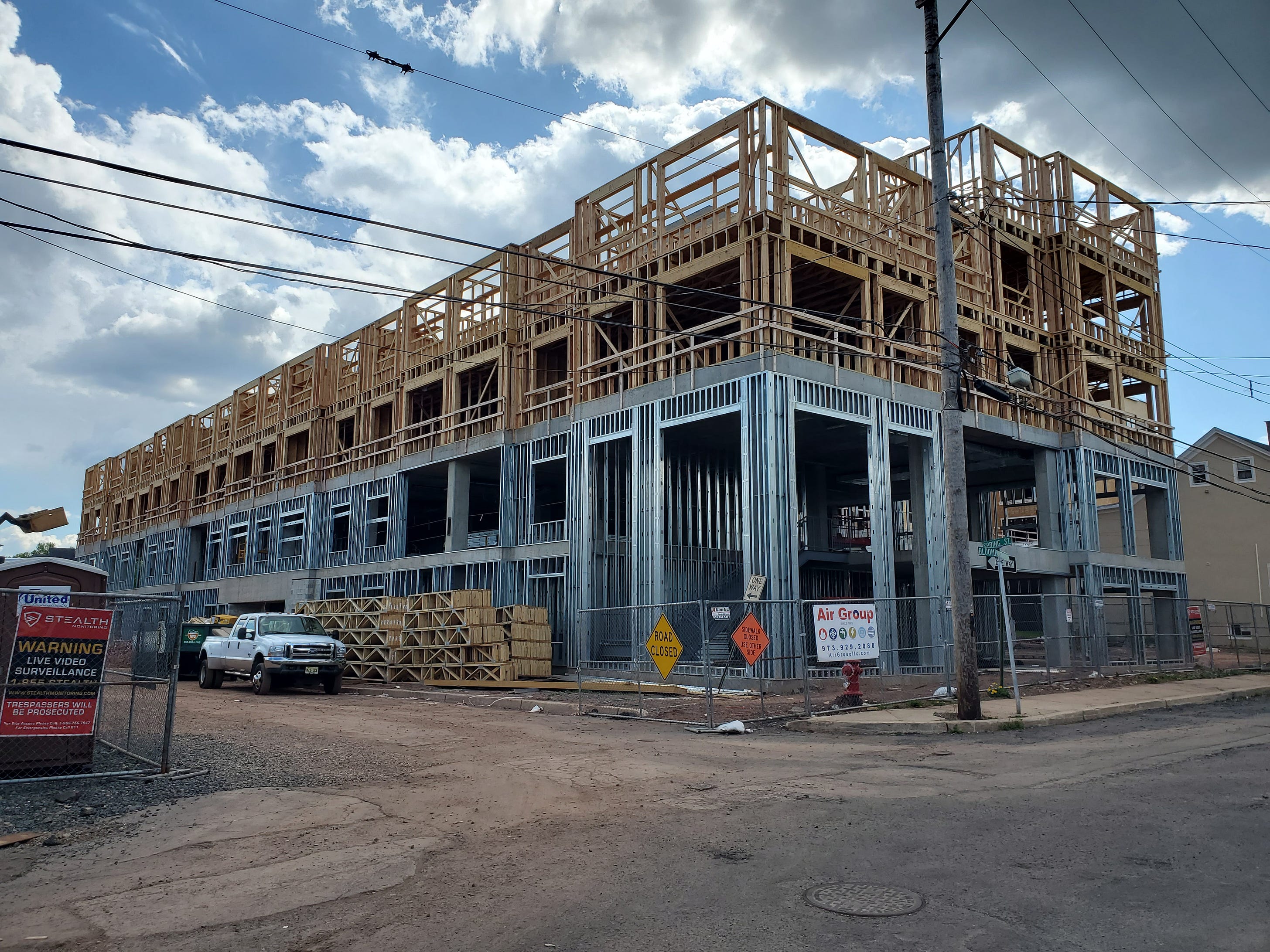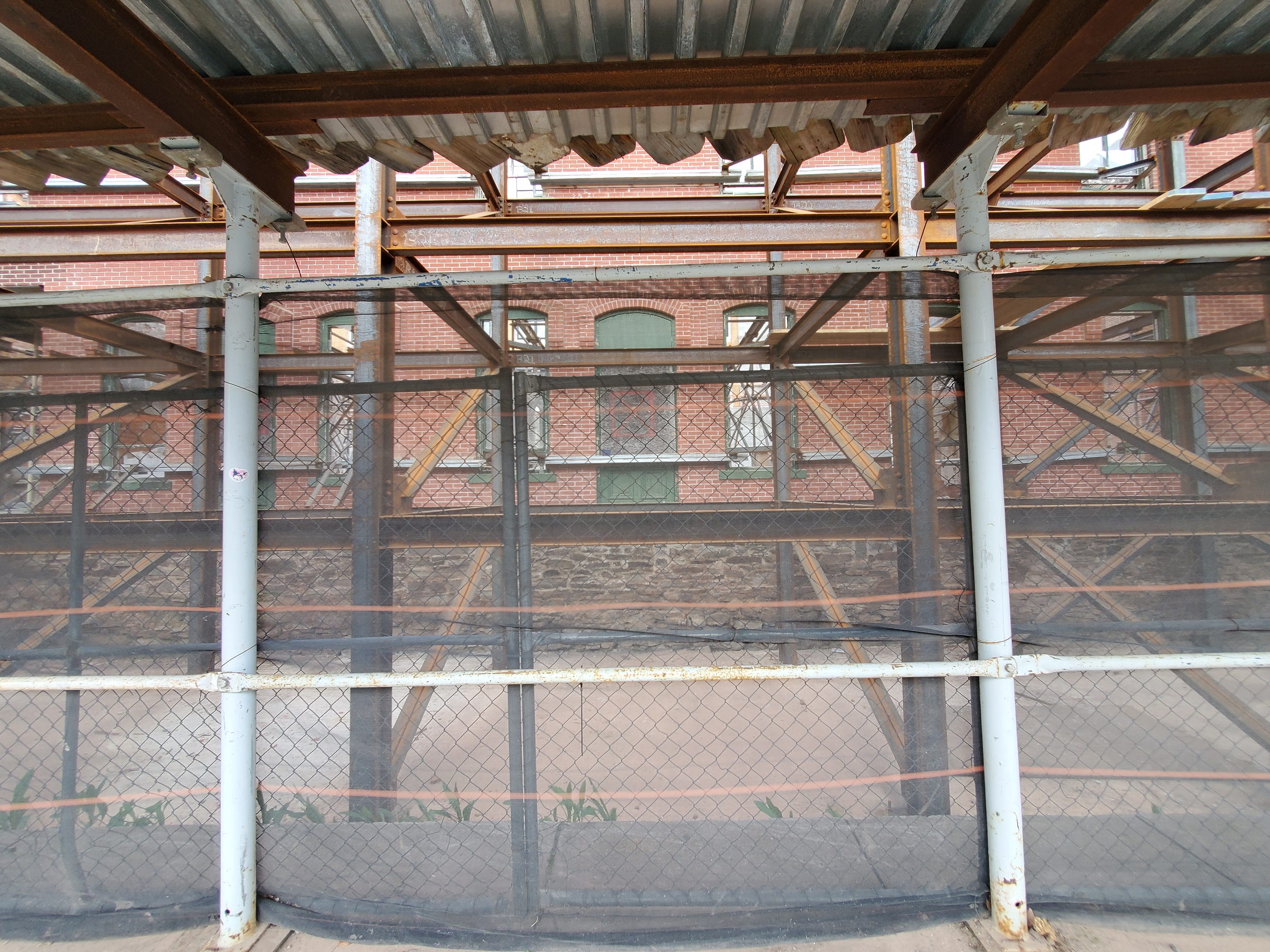The Deleted Scenes - Next Floor, Next Step
Next Floor, Next Step"Urbanism" simply means treating our existing urban communities as real places againIt’s finally truly believable that the big project in my hometown of Flemington—salvaging the exterior of our famous hotel on Main Street, restoring another old structure, and adding new hotel rooms, apartments, retail, and a parking garage—is going to happen. I say “truly believable” because I have a learned skepticism of any big project ever happening. It’s a combination of the large-scale, multi-phase nature of these things, along with the NIMBYism that always comes along and strips down or railroads the project like the sharks devouring the marlin in The Old Man and the Sea. There’s something maddening about it. About hearing that a building will be done or a transit line will open in some given year, and wanting it to be true and also knowing it won’t be. It trains you to oppose everything. In your mind it twins construction noise, delays, cost overruns with new things getting built. Having something in progress is bad. Getting things done is good. Every delay and every fit and start magnifies whatever objections people have, and makes them feel more accurate. Once the damn thing is done, the complaints mostly evaporate. That’s why it’s so crucial to get to done. There’s also a seemingly abandoned project out on the traffic circle at the edge of the old town: a massive sign festooned with now-dead plants and cheap-looking lettering welcoming motorists to historic Flemington. It’s not even fully built: some of the panels hosting the dead plants were never installed, revealing the steel skeleton underneath. It feels like about half the comments on any topic on the Flemington Facebook page I follow mention the sign on the circle. It’s become a little local byword for development gone bad. You can argue that people would oppose everything anyway. But I think it’s impossible to conclude this sort of thing doesn’t erode public trust. But anyway. I’m writing here again in defense of this big project on Main Street involving the hotel, and I’ve been excited about it ever since it got final approval a few years ago. Yet still, there’s this sentiment that it isn’t “for” Flemington—“we” don’t need it, “how will it help existing residents?”, etc. You know the drill. Much as I disagree with this sentiment, I do try to take it seriously and understand it. (I did that here rather philosophically, but in this piece I’m going more practical.) There’s an abstract moral argument some urbanists make here. They’ll say that this rhetoric about “us” and “existing residents” and “people who already live here” is exclusionary (or even, as one guy put it on Twitter, “the definition of fascism”)—that it’s conceptually illegitimate to privilege the people who happen to be here now over the people who might be here or will be here in the future. And there’s a technocratic argument that if growth is happening, then it must be planned for, so that it can unfold in a logical, rather than chaotic, way. But there’s a more convincing argument to me. It’s simply this: you can’t have a town and local economy with just a lot of aging people and old-timers. It’s natural to be more risk-averse as you age, to feel like the world is going to hell. You need a critical mass of young people with some new energy, and money to waste, to do new things—to start businesses, to build things, to have ideas, to get involved in politics or community service. To be optimistic and foolish. You can’t really have a real town with only one income level, and you can’t really have a real town with only one age bracket. I’m not saying everyone in Flemington is old, and I’m not saying there’s anything wrong with old people. And this is not anti-Boomer sentiment. Older folks, it should be pointed out, face a housing problem too, when they need to downsize and there aren’t any places to live in their existing communities. In fact, one comment on a recent thread on that Flemington Facebook group was very interesting: an older man said he planned to move into one of these apartments on Main Street after downsizing and selling his house, and live out his old age right in the middle of his old town. That’s the sort of thing you make possible for people when you build. Someone that age will have trouble with an old-school walk-up apartment. They’ll appreciate the security and the amenities of a modern building. But those new, modern apartments will also attract young people. One skeptical argument goes, You can’t enliven Main Street and the local business situation by simply bringing in people. You’ll just have a lot of people and traffic, and nowhere for anyone to go. Maybe? But how else do you get businesses to open up and have enough foot traffic to sustain them? I don’t think there’s really any other answer. The answer to why we used to have a vibrant Main Street was first that suburbia and big-box retail barely existed (in the old golden age), and second, more recently, that Flemington for many years drew enough people with its famous outlet center that Main Street coasted on the constant outside foot traffic. I suspect a lot of people knew but didn’t really feel how important that outside traffic was to the liveliness of what always a pretty small, low-key place. The changes in retail mean that Main Street no longer has to be full of businesses, and that Flemington can no longer attract enough visitors to carry a whole downtown economy. Maybe an infusion of new residents won’t work, but I don’t see any other way. Maybe if a few hundred people move to Flemington as new housing units come online in the next few years, four or five people will be inspired to start a business or organization or otherwise do something that meaningfully enhances the place for everyone. This gets me back to a fellow I’ve written about before, who moved to Flemington from Northern Virginia suburbia and opened a store on Main Street. He felt a sense of wonder, excitement, expectation seeing this sleepy but wonderfully intact old-fashioned Main Street. For all the love the old-timers have for the place, they don’t see it with outside eyes. Most young people—20-somethings, 30-somethings—didn’t grow up in an urban environment of any size. We grew up, at most, understanding these old small towns as amenities, places you went for a stroll or an ice cream, to break up the scenery of the suburbs. The idea that you could live in one of these places, step right out of your apartment into the middle of town—tiny as it might be—remove that friction of the car and a 5-10 drive separating you from everything…to me, and to a lot of people my age, that’s amazing. It’s the coolest damn thing in the world. In 30 or 40 or 50 years, maybe, we’ll want a decent little modern apartment on a little American Main Street too. Or maybe we’ll be saying, been there, done that. But you don’t get to been there, done that without actually being there and doing it. That’s what we’ve suppressed for decades, encasing our loveliest places in amber, treating them like collectibles to be admired rather than real, living, dynamic places to be inhabited. That’s what I see when I see a new building in an old town. Related Reading: Thank you for reading! Please consider upgrading to a paid subscription to help support this newsletter. You’ll get a weekly subscribers-only piece, plus full access to the archive: over 900 pieces and growing. And you’ll help ensure more like this! You're currently a free subscriber to The Deleted Scenes. For the full experience, upgrade your subscription. |
Older messages
The Opposite Of Small Town Blues
Tuesday, May 14, 2024
Highways weren't made for people, and classic urban fabric wasn't made for cars ͏ ͏ ͏ ͏ ͏ ͏ ͏ ͏ ͏ ͏ ͏ ͏ ͏ ͏ ͏ ͏ ͏ ͏ ͏ ͏ ͏ ͏ ͏ ͏ ͏ ͏ ͏ ͏ ͏ ͏ ͏ ͏ ͏ ͏ ͏ ͏ ͏ ͏ ͏ ͏ ͏ ͏ ͏ ͏ ͏ ͏ ͏ ͏ ͏ ͏ ͏ ͏ ͏ ͏ ͏ ͏ ͏
Closer And Further Away
Monday, May 13, 2024
Do lower densities make places feel crowded? ͏ ͏ ͏ ͏ ͏ ͏ ͏ ͏ ͏ ͏ ͏ ͏ ͏ ͏ ͏ ͏ ͏ ͏ ͏ ͏ ͏ ͏ ͏ ͏ ͏ ͏ ͏ ͏ ͏ ͏ ͏ ͏ ͏ ͏ ͏ ͏ ͏ ͏ ͏ ͏ ͏ ͏ ͏ ͏ ͏ ͏ ͏ ͏ ͏ ͏ ͏ ͏ ͏ ͏ ͏ ͏ ͏ ͏ ͏ ͏ ͏ ͏ ͏ ͏ ͏ ͏ ͏ ͏ ͏ ͏ ͏ ͏ ͏ ͏ ͏ ͏ ͏ ͏
Trolling Alone
Saturday, May 11, 2024
Or, unfortunately, together ͏ ͏ ͏ ͏ ͏ ͏ ͏ ͏ ͏ ͏ ͏ ͏ ͏ ͏ ͏ ͏ ͏ ͏ ͏ ͏ ͏ ͏ ͏ ͏ ͏ ͏ ͏ ͏ ͏ ͏ ͏ ͏ ͏ ͏ ͏ ͏ ͏ ͏ ͏ ͏ ͏ ͏ ͏ ͏ ͏ ͏ ͏ ͏ ͏ ͏ ͏ ͏ ͏ ͏ ͏ ͏ ͏ ͏ ͏ ͏ ͏ ͏ ͏ ͏ ͏ ͏ ͏ ͏ ͏ ͏ ͏ ͏ ͏ ͏ ͏ ͏ ͏ ͏ ͏ ͏ ͏ ͏ ͏ ͏ ͏ ͏ ͏
New and Old #161
Friday, May 10, 2024
Friday roundup and commentary ͏ ͏ ͏ ͏ ͏ ͏ ͏ ͏ ͏ ͏ ͏ ͏ ͏ ͏ ͏ ͏ ͏ ͏ ͏ ͏ ͏ ͏ ͏ ͏ ͏ ͏ ͏ ͏ ͏ ͏ ͏ ͏ ͏ ͏ ͏ ͏ ͏ ͏ ͏ ͏ ͏ ͏ ͏ ͏ ͏ ͏ ͏ ͏ ͏ ͏ ͏ ͏ ͏ ͏ ͏ ͏ ͏ ͏ ͏ ͏ ͏ ͏ ͏ ͏ ͏ ͏ ͏ ͏ ͏ ͏ ͏ ͏ ͏ ͏ ͏ ͏ ͏ ͏ ͏ ͏ ͏ ͏ ͏ ͏ ͏ ͏
You Can Take It With You
Thursday, May 9, 2024
But you can't pass it on ͏ ͏ ͏ ͏ ͏ ͏ ͏ ͏ ͏ ͏ ͏ ͏ ͏ ͏ ͏ ͏ ͏ ͏ ͏ ͏ ͏ ͏ ͏ ͏ ͏ ͏ ͏ ͏ ͏ ͏ ͏ ͏ ͏ ͏ ͏ ͏ ͏ ͏ ͏ ͏ ͏ ͏ ͏ ͏ ͏ ͏ ͏ ͏ ͏ ͏ ͏ ͏ ͏ ͏ ͏ ͏ ͏ ͏ ͏ ͏ ͏ ͏ ͏ ͏ ͏ ͏ ͏ ͏ ͏ ͏ ͏ ͏ ͏ ͏ ͏ ͏ ͏ ͏ ͏ ͏ ͏ ͏ ͏ ͏ ͏ ͏
You Might Also Like
The Must-See Movies The Oscars Overlooked
Friday, February 28, 2025
Plus: Celebrities pay tribute to Michelle Trachtenberg. • Feb. 28, 2025 Up Next Your complete guide to industry-shaping entertainment news, exclusive interviews with A-list celebs, and what you should
The Best Cropped Jackets for Spring, Styled by Us
Friday, February 28, 2025
Plus: What we carried in our bags at Fashion Week. The Cut Shop February 28, 2025 Every product is independently selected by our editors. Things you buy through our links may earn us a commission.
The chicken and the eggs
Friday, February 28, 2025
and where they both come from ͏ ͏ ͏ ͏ ͏ ͏ ͏ ͏ ͏ ͏ ͏ ͏ ͏ ͏ ͏ ͏ ͏ ͏ ͏ ͏ ͏ ͏ ͏ ͏ ͏ ͏ ͏ ͏ ͏ ͏ ͏ ͏ ͏ ͏ ͏ ͏ ͏ ͏ ͏ ͏ ͏ ͏ ͏ ͏ ͏ ͏ ͏ ͏ ͏ ͏ ͏ ͏ ͏ ͏ ͏ ͏ ͏ ͏ ͏ ͏ ͏ ͏ ͏ ͏ ͏ ͏ ͏ ͏ ͏ ͏ ͏ ͏ ͏ ͏ ͏ ͏ ͏ ͏ ͏ ͏ ͏ ͏ ͏ ͏ ͏ ͏
March's Guest Editor: Kim Addonizio
Friday, February 28, 2025
Thank you for supporting Poem-a-Day ͏ ͏ ͏ ͏ ͏ ͏ ͏ ͏ ͏ ͏ ͏ ͏ ͏ ͏ ͏ ͏ ͏ ͏ ͏ ͏ ͏ ͏ ͏ ͏ ͏ ͏ ͏ ͏ ͏ ͏ ͏ ͏ ͏ ͏ ͏ ͏ ͏ ͏ ͏ ͏ ͏ ͏
New and Old #203
Friday, February 28, 2025
Friday roundup and commentary ͏ ͏ ͏ ͏ ͏ ͏ ͏ ͏ ͏ ͏ ͏ ͏ ͏ ͏ ͏ ͏ ͏ ͏ ͏ ͏ ͏ ͏ ͏ ͏ ͏ ͏ ͏ ͏ ͏ ͏ ͏ ͏ ͏ ͏ ͏ ͏ ͏ ͏ ͏ ͏ ͏ ͏ ͏ ͏ ͏ ͏ ͏ ͏ ͏ ͏ ͏ ͏ ͏ ͏ ͏ ͏ ͏ ͏ ͏ ͏ ͏ ͏ ͏ ͏ ͏ ͏ ͏ ͏ ͏ ͏ ͏ ͏ ͏ ͏ ͏ ͏ ͏ ͏ ͏ ͏ ͏ ͏ ͏ ͏ ͏ ͏
Living seasonally
Friday, February 28, 2025
10 things worth sharing this week ͏ ͏ ͏ ͏ ͏ ͏ ͏ ͏ ͏ ͏ ͏ ͏ ͏ ͏ ͏ ͏ ͏ ͏ ͏ ͏ ͏ ͏ ͏ ͏ ͏ ͏ ͏ ͏ ͏ ͏ ͏ ͏ ͏ ͏ ͏ ͏ ͏ ͏ ͏ ͏ ͏ ͏ ͏ ͏ ͏ ͏ ͏ ͏ ͏ ͏ ͏ ͏ ͏ ͏ ͏ ͏ ͏ ͏ ͏ ͏ ͏ ͏ ͏ ͏ ͏ ͏ ͏ ͏ ͏ ͏ ͏ ͏ ͏ ͏ ͏ ͏ ͏ ͏ ͏ ͏ ͏ ͏ ͏ ͏
Are Voters Souring on the Trump Economy?
Friday, February 28, 2025
Trump is starting to pay a price for ignoring the issue that got him elected. ͏ ͏ ͏ ͏ ͏ ͏ ͏ ͏ ͏ ͏ ͏ ͏ ͏ ͏ ͏ ͏ ͏ ͏ ͏ ͏ ͏ ͏ ͏ ͏ ͏ ͏ ͏ ͏ ͏ ͏ ͏ ͏ ͏ ͏ ͏ ͏ ͏ ͏ ͏ ͏ ͏ ͏ ͏ ͏ ͏ ͏ ͏ ͏ ͏ ͏ ͏ ͏ ͏ ͏ ͏ ͏ ͏ ͏ ͏ ͏ ͏ ͏
“Amto remembers Hussein, Aljibbayn 1983” by Kamelya Omayma Youssef
Friday, February 28, 2025
When the martyr died in my arms, / I pleaded ͏ ͏ ͏ ͏ ͏ ͏ ͏ ͏ ͏ ͏ ͏ ͏ ͏ ͏ ͏ ͏ ͏ ͏ ͏ ͏ ͏ ͏ ͏ ͏ ͏ ͏ ͏ ͏ ͏ ͏ ͏ ͏ ͏ ͏ ͏ ͏ ͏ ͏ ͏
Imagine the space gossip
Friday, February 28, 2025
— Check out what we Skimm'd for you today February 28, 2025 Subscribe Read in browser Header Image But first: Is this man testing the Sabrina Carpenter curse? Update location or View forecast Quote
This Dreamy Dress Trend Will Be Everywhere In 3 Months
Friday, February 28, 2025
Fairytale moments from London Fashion Week. The Zoe Report Daily The Zoe Report 2.27.2025 This Dreamy Dress Trend Will Be Everywhere In 3 Months (Runway) This Dreamy Dress Trend Will Be Everywhere In 3


